-
 Bitcoin
Bitcoin $85,053.4987
0.47% -
 Ethereum
Ethereum $1,604.0688
1.50% -
 Tether USDt
Tether USDt $0.9997
-0.01% -
 XRP
XRP $2.0888
1.22% -
 BNB
BNB $593.1504
0.71% -
 Solana
Solana $138.4195
3.26% -
 USDC
USDC $0.9999
-0.01% -
 Dogecoin
Dogecoin $0.1597
3.11% -
 TRON
TRON $0.2415
-1.60% -
 Cardano
Cardano $0.6329
3.08% -
 UNUS SED LEO
UNUS SED LEO $9.2888
0.62% -
 Chainlink
Chainlink $12.7878
1.44% -
 Avalanche
Avalanche $19.2917
1.31% -
 Stellar
Stellar $0.2447
1.18% -
 Toncoin
Toncoin $3.0011
0.71% -
 Shiba Inu
Shiba Inu $0.0...01226
3.89% -
 Hedera
Hedera $0.1676
2.05% -
 Sui
Sui $2.1459
1.63% -
 Bitcoin Cash
Bitcoin Cash $337.7604
2.53% -
 Hyperliquid
Hyperliquid $17.6730
4.32% -
 Polkadot
Polkadot $3.7299
1.72% -
 Litecoin
Litecoin $76.5325
1.77% -
 Dai
Dai $0.9999
0.00% -
 Bitget Token
Bitget Token $4.4634
2.38% -
 Ethena USDe
Ethena USDe $0.9991
0.00% -
 Pi
Pi $0.6486
5.66% -
 Monero
Monero $212.3459
-1.60% -
 Uniswap
Uniswap $5.2591
1.62% -
 Pepe
Pepe $0.0...07316
3.79% -
 OKB
OKB $50.8354
2.04%
How to sell perpetual contracts on BitMart
To sell perpetual contracts on BitMart, create an account, fund it, find the perpetual contracts market, place a sell order with either a market or limit price, and monitor and close your position when desired, understanding the risks involved.
Nov 25, 2024 at 05:44 pm

How to Sell Perpetual Contracts on BitMart
Introduction
Perpetual contracts, also known as perpetual futures, are financial instruments that track the price of an underlying asset, such as Bitcoin or Ethereum, without having an expiry date. This allows traders to speculate on the future price of the asset without the need to take delivery of the underlying asset.
Steps to Sell Perpetual Contracts on BitMart
1. Create a BitMart Account
- Visit the BitMart website and click on "Sign Up" in the top right corner.
- Enter your email address, create a password, and enter the referral code (if you have one).
- Click on "Sign Up" and verify your email address.
2. Fund Your BitMart Account
- Log in to your BitMart account and click on "Deposit."
- Select the coin you want to deposit and follow the instructions provided.
- You can deposit funds via bank transfer, credit card, or cryptocurrency.
3. Find the Perpetual Contracts Market
- Go to the BitMart homepage and click on "Derivatives."
- In the drop-down menu, select "Perpetual."
- Find the perpetual contract for the asset you want to trade.
4. Place a Sell Order
- Click on the "Sell" button on the perpetual contract trading page.
- Enter the number of contracts you want to sell.
- Set the leverage you want to use (note that higher leverage carries higher risk).
- Click on "Sell" to place the order.
5. Monitor Your Positions and Close Them
- You can monitor your open positions in the "Positions" tab of the perpetual contract trading page.
- When you are ready to close a position, click on the "Close" button next to the position.
- Enter the number of contracts you want to close and click on "Close" to confirm.
Selling a Perpetual Contract with a Market Order
- A market order is an order to buy or sell an asset at the current market price.
- To place a market order to sell a perpetual contract, simply click on the "Sell at Market" button on the perpetual contract trading page.
- Your order will be filled at the best available market price.
Selling a Perpetual Contract with a Limit Order
- A limit order is an order to buy or sell an asset at a specified price.
- To place a limit order to sell a perpetual contract, enter the price you want to sell at and the number of contracts you want to sell.
- Your order will only be filled if the market price reaches your specified price.
Understanding the Risks of Selling Perpetual Contracts
- Perpetual contracts are leveraged instruments, which means that they carry higher risk than spot trading.
- The value of your position can fluctuate rapidly in both directions, resulting in significant profits or losses.
- It is important to understand the risks involved before trading perpetual contracts and to use proper risk management strategies.
Additional Tips
- Use stop-loss orders to limit your potential losses if the market moves against you.
- Take breaks from trading to clear your mind and avoid making emotional decisions.
- Use demo accounts to practice trading perpetual contracts before using real money.
- Always do your own research and consult with a financial advisor before making any trades.
Disclaimer:info@kdj.com
The information provided is not trading advice. kdj.com does not assume any responsibility for any investments made based on the information provided in this article. Cryptocurrencies are highly volatile and it is highly recommended that you invest with caution after thorough research!
If you believe that the content used on this website infringes your copyright, please contact us immediately (info@kdj.com) and we will delete it promptly.
- Ripple's XRP price has held on well despite recent market volatility
- 2025-04-19 13:20:13
- With a SHIB burn of nearly 28 billion tokens in a day
- 2025-04-19 13:20:13
- Bitcoin's value has transformed dramatically since its creation, rising from $0.08 in 2010 to an all-time high of $69,000 in 2021.
- 2025-04-19 13:15:13
- Ethereum Whales Have Been Accumulating ETH at a Stash Rate, Pointing to an Impending Price Rally
- 2025-04-19 13:15:13
- This weekend's best sweepstakes casino promos include our favorite providers
- 2025-04-19 13:10:13
- A volatile trading session looms as $2.02 billion in Bitcoin [BTC] options and $280 million in Ethereum [ETH] options are set to expire today.
- 2025-04-19 13:10:13
Related knowledge
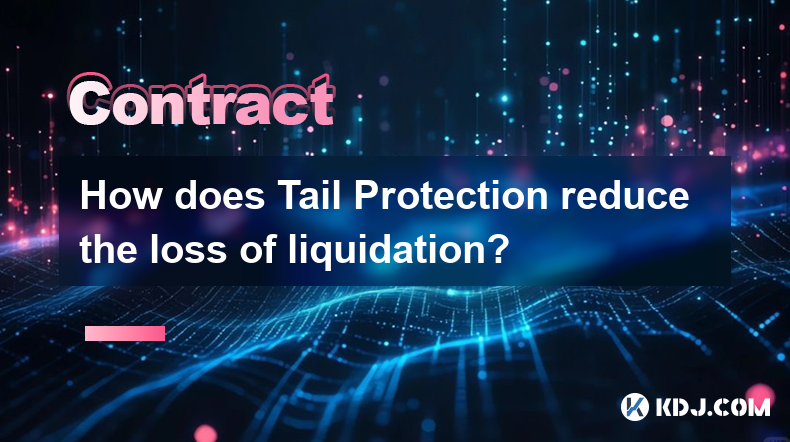
How does Tail Protection reduce the loss of liquidation?
Apr 11,2025 at 01:50am
Introduction to Tail Protection in CryptocurrencyTail Protection is a mechanism designed to mitigate the risks associated with liquidation in cryptocurrency trading. Liquidation occurs when a trader's position is forcibly closed by the exchange due to insufficient margin to cover potential losses. This often happens in leveraged trading, where traders b...
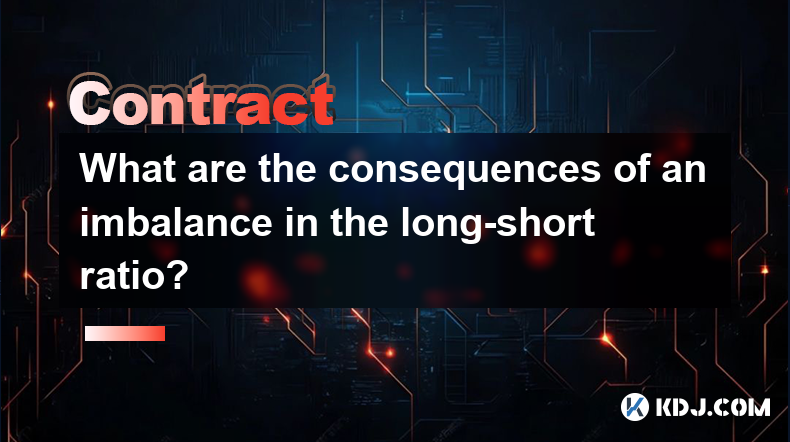
What are the consequences of an imbalance in the long-short ratio?
Apr 13,2025 at 02:50pm
The long-short ratio is a critical metric in the cryptocurrency trading world, reflecting the balance between bullish and bearish sentiments among traders. An imbalance in this ratio can have significant consequences on the market dynamics, affecting everything from price volatility to trading strategies. Understanding these consequences is essential fo...
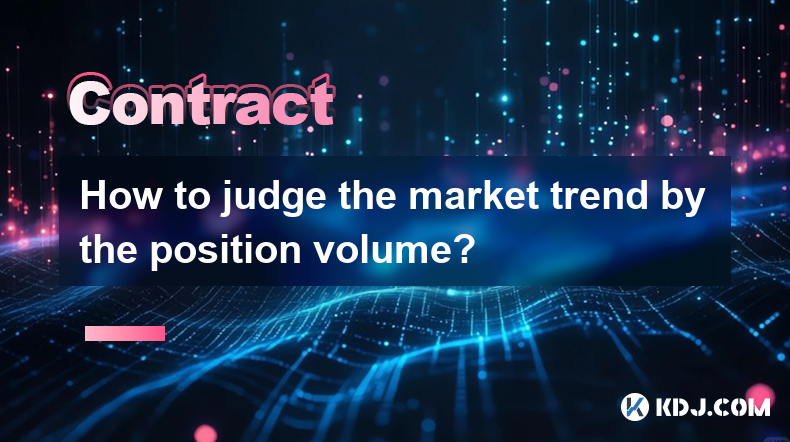
How to judge the market trend by the position volume?
Apr 11,2025 at 02:29pm
Understanding how to judge the market trend by position volume is crucial for any cryptocurrency trader. Position volume, which refers to the total number of open positions in a particular cryptocurrency, can provide valuable insights into market sentiment and potential price movements. By analyzing this data, traders can make more informed decisions ab...

Why does a perpetual contract have no expiration date?
Apr 09,2025 at 08:43pm
Perpetual contracts, also known as perpetual futures or perpetual swaps, are a type of derivative product that has gained significant popularity in the cryptocurrency market. Unlike traditional futures contracts, which have a fixed expiration date, perpetual contracts do not expire. This unique feature raises the question: why does a perpetual contract ...
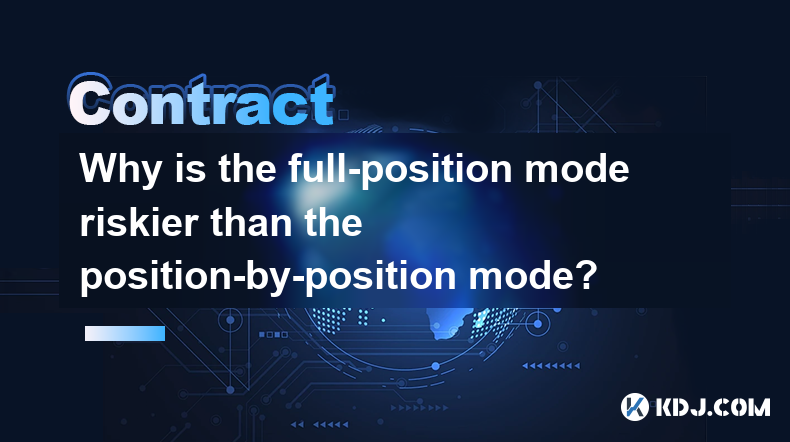
Why is the full-position mode riskier than the position-by-position mode?
Apr 13,2025 at 03:42pm
Why is the Full-Position Mode Riskier Than the Position-by-Position Mode? In the world of cryptocurrency trading, the choice between full-position mode and position-by-position mode can significantly impact the risk profile of a trader's portfolio. Understanding the differences between these two modes is crucial for making informed trading decisions. Th...
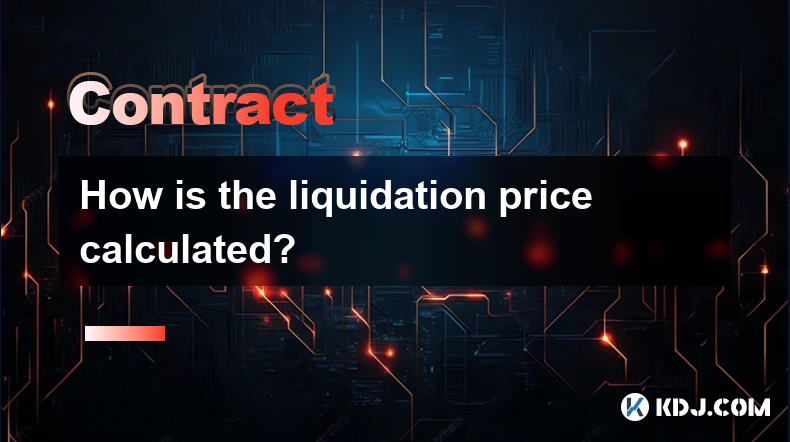
How is the liquidation price calculated?
Apr 12,2025 at 01:35am
Introduction to Liquidation PriceLiquidation price is a critical concept in the world of cryptocurrency trading, particularly when dealing with leveraged positions. Understanding how this price is calculated is essential for traders to manage their risk effectively. The liquidation price is the point at which a trader's position is forcibly closed by th...

How does Tail Protection reduce the loss of liquidation?
Apr 11,2025 at 01:50am
Introduction to Tail Protection in CryptocurrencyTail Protection is a mechanism designed to mitigate the risks associated with liquidation in cryptocurrency trading. Liquidation occurs when a trader's position is forcibly closed by the exchange due to insufficient margin to cover potential losses. This often happens in leveraged trading, where traders b...

What are the consequences of an imbalance in the long-short ratio?
Apr 13,2025 at 02:50pm
The long-short ratio is a critical metric in the cryptocurrency trading world, reflecting the balance between bullish and bearish sentiments among traders. An imbalance in this ratio can have significant consequences on the market dynamics, affecting everything from price volatility to trading strategies. Understanding these consequences is essential fo...

How to judge the market trend by the position volume?
Apr 11,2025 at 02:29pm
Understanding how to judge the market trend by position volume is crucial for any cryptocurrency trader. Position volume, which refers to the total number of open positions in a particular cryptocurrency, can provide valuable insights into market sentiment and potential price movements. By analyzing this data, traders can make more informed decisions ab...

Why does a perpetual contract have no expiration date?
Apr 09,2025 at 08:43pm
Perpetual contracts, also known as perpetual futures or perpetual swaps, are a type of derivative product that has gained significant popularity in the cryptocurrency market. Unlike traditional futures contracts, which have a fixed expiration date, perpetual contracts do not expire. This unique feature raises the question: why does a perpetual contract ...

Why is the full-position mode riskier than the position-by-position mode?
Apr 13,2025 at 03:42pm
Why is the Full-Position Mode Riskier Than the Position-by-Position Mode? In the world of cryptocurrency trading, the choice between full-position mode and position-by-position mode can significantly impact the risk profile of a trader's portfolio. Understanding the differences between these two modes is crucial for making informed trading decisions. Th...

How is the liquidation price calculated?
Apr 12,2025 at 01:35am
Introduction to Liquidation PriceLiquidation price is a critical concept in the world of cryptocurrency trading, particularly when dealing with leveraged positions. Understanding how this price is calculated is essential for traders to manage their risk effectively. The liquidation price is the point at which a trader's position is forcibly closed by th...
See all articles
























































































